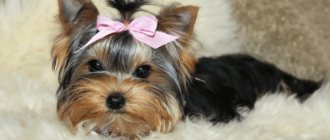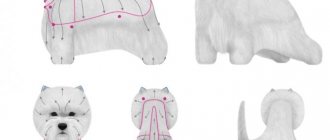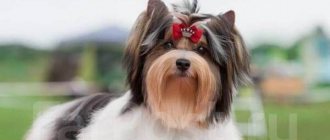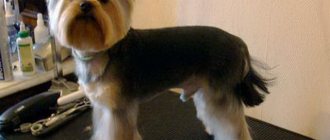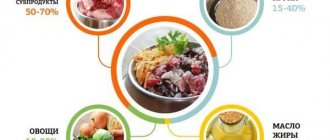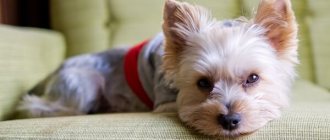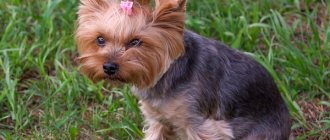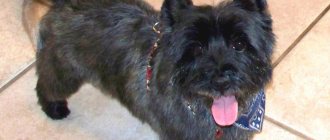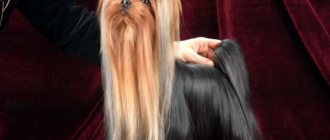Mini Yorkshire Terrier is a tall variety of Yorkie. With the exception of size, the characteristics of the breeds are the same. But since miniature Yorkies almost lack the hunting instincts of terriers, they are less active and better suited to city life.
Mini Yorkshire Terriers were bred by crossing the smallest puppies from different litters. However, despite the fact that this size deformation looks cute, it negatively affects the health of dogs.
Brief history of origin
Officially, the Yorkshire Terrier was bred in Yorkshire in Great Britain at the end of the 18th century. But dog experts say that the breed is more than 2000 years old. The ancestors of Yorkies are Skye terriers, lapdogs, and Manchesters.
Doggies were originally known as poor man's dogs. They helped catch rodents in barns, on ships, and in houses. These animals were kept in mines so that they could predict collapses. Large dogs were taxed and were not allowed into narrow passages.
At the beginning of the 19th century, when industrialization peaked, people moved from Scotland to England and took their pets with them. At that time, Yorkies weighed about 8–10 kg and were little similar to modern individuals.
In the center of Britain, breeders noticed the breed, improved it and gave it to the aristocrats. Since then, Yorkshire terriers do not catch mice, but bask on pillows and feather beds.
Interesting Facts
- The Mini Yorkie girl is registered in the Guinness Book of Records as the smallest dog in history. Silvia weighs only 113 grams with a height of 6.35 cm at the withers.
- From these dogs a new breed emerged - the Yorkshire Terrier Biewer. It differs from the standard Yorkie in its white wavy strands.
- Mini Terrier is the first dog to become a doctor. During World War II, Smokey the dog helped in hospitals and entertained soldiers.
- All individuals of the breed have a feature - reverse sneezing. The process sounds like lung spasms, but in reality this is how doggies clear their noses of dust, pollen, and debris.
- Yorkie puppies sleep most of the day (90%).
Breed description, standards and appearance
Interestingly, there is no lower limit for height or weight for the Yorkshire Terrier. The maximum weight for an individual is 3.2 kg. Mini weighs up to 2 kg. The average height is 15–20 cm. Although there are dogs that grow up to 30–37 cm and can weigh 5–8 kg. This is a defect; adult animals of this size cannot participate in breeding.
The standard description of mini Yorkshire terriers includes a detailed description of the external qualities of the animal:
- The head is round with a bright stop and brow ridge.
- The muzzle is slightly shorter than the skull, square, not narrowed towards the nose. The jaw is strong with a scissor bite. Complete set of teeth.
- The nose is small and black.
- The eyes are round, medium in size, set high.
- The ears are medium, triangular in shape, stand on solid cartilage, and do not fall.
- The body is rectangular, slightly elongated. The topline is straight, the loin is wide. The neck is long and curved, the belly is tucked.
- The Yorkshire Terrier's tail is long, curled into a loose ring, but not thrown over the back.
- The limbs are straight, parallel with rounded paws.
- The wool is single-layer, silk, soft.
- Colors: silver, brown, black and tan, black with gray.
Differences between standard and mini Yorkies
Officially, the standard allows two height variations for the Yorkshire Terrier breed: standard, mini.
They differ only in size; if for standard Yorkies the weight norm is 2.5–3.5 kg, then for mini ones it is 1.5–2 kg. There are no other external or behavioral differences, although the owners believe that small Yorkies are kinder and calmer.
Interesting. Now babyface terriers have appeared on the breed market. This term literally means "baby face". Baby face dogs have a short muzzle and large, close-set eyes, making them look like puppies. This unnatural deformation is not a standard form and negatively affects the dog’s health.
Characteristics of Yorkies
The description of the breed is determined by the International Canine Federation. According to standards, the body weight of a Yorkshire Terrier should not be more than 3.1 kg. The minimum weight and size of a dog are not regulated. Yorkie's height doesn't matter either.
Useful article: Rules for feeding Yorkies at home
The remaining characteristics of the Yorkshire Terrier are presented in the table:
| Part of the body | Description |
| Head | Skull small, flat |
| Muzzle | Small, short |
| Eyes | Dark, non-convex |
| Jaws | Even bite, the upper incisors sit tightly in front of the lower teeth |
| Ears | Wide apart, triangular |
| Undercoat | Absent |
| Limbs | Straight, densely covered with hair |
| Frame | Compact, short back |
| Tail | To be docked to the middle |
Good to know: 3 ways to fit the ears of a Yorkshire Terrier
Character and behavior
Mini terriers are absolutely not aggressive, they are kind, affectionate and flexible. Yorkies are one of the most cheerful dogs. The breed is famous for its love, devotion and family affection. But to a greater extent, the character of dogs depends on their upbringing.
Mini Yorkshire Terriers are very smart. They are rarely trained correctly, more often they are pampered, allowing them to sleep in the same bed with members of the household and eat from the table. Due to the lack of a firm hand, Yorkie puppies relax and sit on the owner’s neck; they can manipulate their owners and test their patience.
Yorkies cannot be called hyperactive. They like to play, run and walk outside, but they will always adapt to a person’s mood, support if they are sad, and share happy moments.
Find out how to train a Yorkie at home.
Spitz mix
One of the most common mixes of Yorkshire terriers are those obtained as a result of mating with Spitz dogs.
Both of these breeds are indoor decorative and have a lot of positive qualities, among which they especially highlight:
- friendliness;
- intelligence and intelligence;
- devotion;
- cheerful disposition;
- ability to learn;
- lack of aggression;
- the ability to capture the owner’s emotions, empathy.
In addition, both Yorkies and Spitz dogs are famous for their beautiful exterior.
Puppies born from such a union take the best qualities from their parents - they inherit the most attractive features of appearance and health. The risk of developing genetic diseases in such dogs is minimal, and experienced breeders claim that mixed breeds have better health and a high survival rate.
As adults, Yorkie and Spitz mixes are small and, less often, medium in size. This is the only thing you can count on in advance, because... the rest of the appearance is impossible to predict - the length, structure, color of the coat can be anything, each puppy has a unique set of characteristics.
The future character of the puppy also cannot be predicted, however, all the shortcomings that may appear in the dog as it grows and develops can be easily corrected during the training process.
How to choose the right puppy?
Since mini Yorkshire terriers are one of the most common breeds in the world, you don’t have to go to Moscow to buy a puppy: there are dozens of nurseries all over Russia. Preference should be given to the one that has a lot of positive reviews from real clients, has documents and a license for breeding and selling mini Yorkies.
The baby must be strong, healthy and meet the standards. English Yorkshire Terrier puppies are completely black with a brown muzzle. The wool is soft and fluffy.
This is an ornamental breed that does not have protective instincts, so it is better to choose the baby that was the first to reach out to potential owners.
Lifespan
Mini Yorkies live from 12 to 16 years. Some individuals have a life expectancy of 7 to 9 years, as they are not in such good health as large dogs. Miniature Yorkies have fairly fragile bones that can break even when jumping off the couch. Often, owners of dwarf dogs go to clinics with dislocations in their pets.
Yorkies live up to 16 years
In order for a pet to live a long time and not get sick, the owner must regularly take it for vaccinations. The Yorkshire Terrier must be vaccinated against the following diseases:
- hepatitis, enteritis;
- plague;
- rabies.
For your information! Dogs can be carriers of dangerous infections. Vaccinations will help protect not only the puppy, but also its owners from such a terrible disease as rabies.
After buying a mini puppy, you need to constantly look at your step, otherwise there is a risk of not noticing the pet and simply crushing it.
Puppies
Mini Yorkie puppies are sold after weaning at 2-3 months. The babies are small in size and can even fit in the palm of your hand. Mini Yorkies grow up to the age of 1–1.5 years, although their size does not change much, but the color of their coat becomes lighter: brown or silver.
Mini Yorkshire Terrier puppies look like dark fluffy balls with a small, short muzzle and large eyes.
Mating
Yorkie breeding is not always breeding due to their large population throughout the world. One way or another, the male and female must meet the standards, be vaccinated and examined for pathology by a veterinarian .
- Puberty occurs at 8-9 months. At this time, males begin to breed, and girls go into heat.
- You can only breed at the 20th month of life, when the female goes into her third heat. The readiness of a bitch can be determined by several signs: the discharge becomes lighter, the loop swells, the girl spreads her paws wide and throws back her tail.
- For the first mating, you can invite a specialist to help your pets. The female is brought to the male's territory, where the acquaintance should take place. The dogs should be given 10-15 minutes to sniff and get used to each other. When the bitch is ready, she will let the male do the mounting.
- The act does not last long - 10 minutes, and the lock from 15 to 30. The girl must be held under the stomach, not allowed to sit down. The male is directed into the noose. Due to the difference in size, the boy may simply not be able to reach it, in which case he needs to be seated.
- Mating is repeated after 2 days.
Care and maintenance
Caring for and maintaining the Mini Yorkshire Terrier breed is not difficult. Yorkie puppies quickly get used to the house, routine, and tolerate hygiene procedures. Mini Yorkies don't even need to be trained. But at the same time, dogs need quality nutrition and coat care.
Before moving in a Yorkshire Terrier puppy, you need to fence off an area for him to sleep and have a home toilet. This will make it easier for the baby to get used to it. It is better to hide small toys and sharp objects in advance. You should also place your bowls on stands so that you can change the height as they get older.
The right diet
The nutrition of a mini Yorkshire terrier is one of the main components of its health. Dwarf dogs have a very delicate stomach and esophagus. Any prohibited product eaten, even in the smallest quantities, can lead to poisoning, intestinal volvulus, and shutdown of the gastrointestinal tract.
Feeding mini Yorkshire terriers can be natural or dry. Both options are equivalent if selected correctly. Industrial feeds are somewhat more expensive, but they save time for the owner.
For mini Yorkshire terriers, it is recommended to purchase super-premium food with low calorie content and small granules. This product contains a complex of vitamins for wool.
For more information on how to choose a diet for your pet, see the article “Feeding your Yorkie.”
The natural diet includes lean meat, sea fish, dairy products, cereals, vegetables and fruits. A serving should consist of 50% protein, 40% carbohydrates and 10% fat. Turkey, chicken, rabbit, lamb are ideal. The following porridges are allowed: buckwheat, rice, barley and oatmeal.
Important. Mini breeds should absolutely not be given bones and hard cartilage. Sharp chips can damage a weak esophagus.
An adult Yorkshire Terrier should eat 40–60 g of food at a time. 2 feedings are required per day. For a baby, 20–30 g is enough, but 4–5 times a day. Puppies up to three months are fed primarily with dairy products.
It is forbidden to give your dog sweets, flour, salty, fatty and fried foods. Mini terriers rarely have allergies, but it is not advisable to give Yorkies tomatoes, onions, potatoes, cabbage and legumes.
Important. Your pet should not be given pork, butter or chocolate.
Care and hygiene
The Super Mini Yorkshire Terrier may seem difficult to care for due to its long coat. In fact, the hair is trimmed regularly, leaving only the mane around the head, the tip of the tail and the feathers on the paws. There are different model haircuts, but show dogs cannot have them. The coat is combed daily with a long-toothed metal comb.
Dwarf Yorkies are bathed weekly with baby or special zoological shampoo. You can wash it more often as it gets dirty. After eating, you should thoroughly wipe your beard with a damp towel. The eyes and ears are examined and cleared of accumulated secretions. Nails are trimmed once a month.
For your information. Seasonal treatment against ticks and fleas is required. You can use a collar, drops or sprays. Mini Yorkies are dewormed every three months.
What to feed
Representatives of this breed, like Yorkshire terriers, have a sensitive digestive system. Not every food is suitable for them. The owner must decide on the type of food (natural or industrial food) even before taking the puppy into the house. It is best to make this choice based on the recommendations of your veterinarian. An incorrectly selected diet can cause many diseases: allergies, pancreatitis, gastrointestinal disorders.
Industrial feed
For small toy dogs, you should select a high-quality commercial food designed specifically for such pets. Food must satisfy the high energy needs of active pets, be balanced and complete, and be well absorbed by the gastrointestinal tract of animals.
The best brands of food for the Biewer Terrier breed:
- Eukanuba Breed Specific (Yorkshire Terrier);
- Grandorf;
- Advance (Yorkshire Terrier);
- Brit Care (Yorkshire Terrier);
- Royal Canin (Yorkshire Terrier).
Natural nutrition
The diet for dogs on a natural diet is compiled taking into account their age, weight and physiological condition. The menu is based on lean meats, lean sea fish (fillets), raw tripe, and boiled offal.
In addition, the diet should contain:
- vegetables;
- dairy products;
- quail egg;
- greenery;
- vegetable oil;
- Brewer's yeast;
- vitamin and mineral complexes.
Vaccinations and susceptibility to disease
Vaccination is not a worldwide conspiracy, but a procedure that allows you to protect your puppy and adult Yorkie from dangerous viruses. The dog's immunity is not able to overcome distemper, enteritis, hepatitis, parainfluenza, leptospirosis and rabies.
These infectious diseases are deadly to animals, and some of them are also deadly to humans. Without age-related vaccination against these viruses, a dog cannot be transported across the border or bred to produce offspring.
At 2.5 months, the puppy is given an injection with inactive strains of canine distemper, enteritis and hepatitis. After 2 weeks, vaccination against leptospirosis and parainfluenza is added. At 7 months they are vaccinated against rabies, and at one and a half years all vaccinations are repeated. Miniature Yorkshire Terriers are revaccinated annually.
Important. There are also additional optional vaccinations (against demodicosis, lichen). They are being done at the peak of the exacerbation of morbidity in the region.
In addition to dangerous infectious diseases, Mini Yorkies also have hereditary health problems:
- hip dysplasia;
- weak digestive system;
- fragile skeleton;
- epilepsy;
- orthodontic pathologies;
- diabetes;
- difficult childbirth.
Popular colors
The most popular color of Mini Yorkies is considered steel-gray with reddish-red, characteristic of the standard variety of the breed (shown in the photo).
With this color, the body from the withers to the tail is painted steel gray. The head and paws are brownish-red, and the chest is golden or ash-colored.
The boundaries of these colors must be clear; the inclusion of hairs of other colors in places not provided for by the standard is a serious drawback.
There are mini Yorkies with colors characteristic of Biewer Yorkies and Biro Yorkies : that is, black or brown spots with reddish tan on a white background .
Miniature Yorkies can also be chocolate or fawn in color. But, considering that there are not too many standard-sized Yorkies with this color yet, mini Yorkies of these colors are extremely rare.
How long do mini Yorkshire terriers live?
The lifespan of small dogs is slightly longer than that of large dogs.
Subject to quality nutrition, timely veterinary care and age-appropriate vaccinations, Mini Yorkshire Terriers live 14–17 years.
Life expectancy also depends on the place of “habitat”. Outside the city limits, dogs will live 2–3 years longer.
Pros and cons of the breed
The Dwarf English Yorkshire Terrier is an excellent pet for keeping in an apartment.
He doesn't take up much space, goes to the litter box, tolerates other pets and gets along with others. But the mini Yorkshire Terrier needs a family that can devote enough time to caring for the pet.
| pros | Minuses |
| Cute miniature pet doesn't take up much space | Poor health, fragile skeleton |
| Kind and loyal family member | Little Yorkie is very jealous and touchy |
| Has a developed intellect, smart and easy to train | The breed is stubborn |
| Mini Yorkies can live without walking and go to the litter box | Terrier instincts often awaken (digging, gnawing, wallowing in garbage) |
| A small Yorkie eats little: requires less food than a large dog | The Miniature Yorkie has a long coat that requires careful grooming. |
| The mini Yorkshire Terrier does not emit odors and does not shed. | The Micro Yorkshire Terrier can be annoying and constantly needs attention. |
Mini York Terriers are popular among city dwellers. There is an established opinion that if the dog is small, then it can live in a small apartment without walking and communication.
In fact, like all animals, the Mini Yorkie loves to be in the fresh air, frolic with his fellow animals and hunt small animals.
Proper feeding
In order for a mini-pet to live long and please its owners, it is necessary to provide it with the right diet. There are two options:
- Feed your Yorkie natural food that you prepare yourself. In this case, you need to be prepared to cook porridge, meat and regularly give vitamins;
- feed the animal with prepared food. It is better to choose premium products. Some Yorkies have sensitive digestion. In this case, only special food is suitable, which can be purchased after consulting with a veterinarian.
There are two feeding options
. Important! Mini Yorkshire Terriers are often allergic. It is necessary to find out what product this reaction occurs to and completely eliminate it from the animal’s diet.
Many dog breeders feed their Mini Yorkies natural food because the dog refused to eat all the ready-made food offered. You cannot give your pet food from your own table, even if his gaze looks pityingly at the owner and at his plate. The terrier must have its own menu. A miniature dog can:
- chicken, turkey meat (if there is no allergy to this product);
- porridge with water (buckwheat, oatmeal);
- vegetables (zucchini, cucumber, carrots, pumpkin, bell pepper). Food should be given in small portions. Cabbage is prohibited, it provokes bloating;
- fruits. Yorkies love apples, pears, and bananas. It is important not to overfeed your pet;
- cottage cheese.
Many owners, after purchasing a puppy, wonder how much food their dog needs. Breeders recommend feeding puppies four times a day in small portions and as the terrier matures, switching to three meals a day. Some give adult dogs food twice a day.
Note! The portion should be calculated based on the weight of the pet; for each kilogram you can give 1 tbsp. spoon. For those who feed their mini-dog with ready-made dog food, tables with feeding recommendations are printed on the packaging.
After eating, the bowl with leftover food should be removed. Your Yorkie should always have a bowl of fresh water within his reach.
